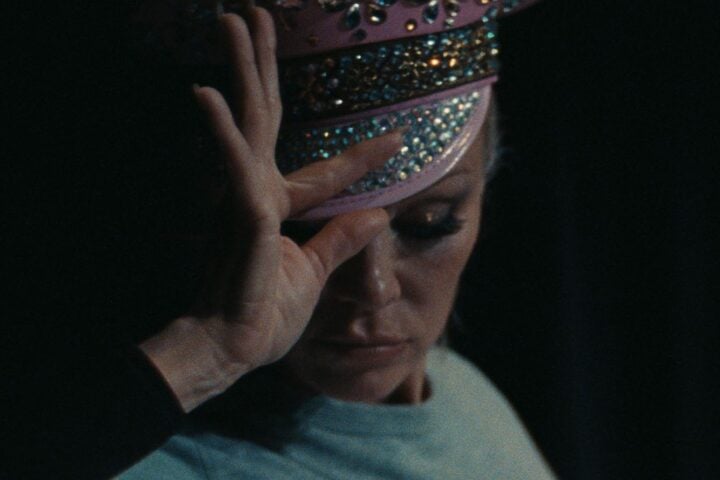For years, rights issues have held up updated video releases of James Cameron’s Aliens, The Abyss, and True Lies, with the latter two features skipping Blu-ray entirely. At last, all three have come to 4K UHD, and their joint release allows one to better appreciate the unexpected connections that link these otherwise completely distinct features.
On a basic level, all three films, covering less than a decade from 1986 to 1994, chart one of the most meteoric career rises in Hollywood history—one that you can see in their exponentially increasing budgets and scale. Aliens, made in the wake of Cameron’s breakout success of 1984’s The Terminator, was produced for a paltry $18 million, not much more than the $11 million allocated to Ridley Scott’s Alien nearly a decade earlier. But Cameron, who cut his teeth in Roger Corman’s micro-budget talent incubator, knew how to stretch a dollar to its maximum use.
Working hands-on with concept artist Syd Mead and effects wizard Stan Winston, Cameron crafts a series of distinctive interiors that blend utilitarian functionality (a space colony’s bland laboratories and corridors) and outlandish style (biomass-covered nests filled with alien eggs and hatchlings). Gone is the incredibly sustained creeping dread of Scott’s film, replaced with the propulsive action-horror that Cameron all but perfected with The Terminator, moving through each set with a methodical precision that gives the viewer enough time to acclimate to the layout of each space but not enough to notice some of the seams of inventive cost-cutting.
The success of Aliens allowed Cameron to command larger resources for The Abyss. Set aboard the Deep Core, an experimental underwater drilling platform commandeered by the U.S. military to retrieve a sunken nuclear submarine, the film required mammoth sets, including a labyrinthine station of metal bulkheads and industrial piping, as well as a colossal water tank for underwater shots. The Abyss also marked Cameron’s first sustained experiment with CGI to craft the aliens that the characters inadvertently discover in the ocean’s depths.
The film is still mostly driven by practical means, including some daring underwater stunts as the characters face flooded interiors and ominous dives on dwindling oxygen, but the CGI marks a clear new evolution in Cameron’s toolkit that he would expand dramatically with 1991’s Terminator 2: Judgment Day. That film would catalyze a new era in visual effects, which makes True Lies and its old-school, if outsized, stunts something of a farewell to the ’80s blockbuster, complete with Arnold Schwarzenegger as his action-comic best, spouting cornball puns and walking a fine line between ruthless efficiency and bumbling obliviousness as a government spy.
Setting a record at the time for its budget (it was the first film to cost $100 million), True Lies puts every cent onto the screen with an escalating series of set pieces that culminates in a multi-stage climax that transitions from a chase sequence between a helicopter and car to a huge shootout. In between we get the spellbinding sight of a nuke going off in the Florida Keys. Years of making the most of a budget primed Cameron to use his mega-budgets wisely, and True Lies is every bit as focused and purposeful in its movement as Aliens.
These films also share a unified sense of humanity that makes Cameron’s work enduringly resonant beyond mere spectacle. All three hinge on the trope, both lauded and criticized, of the strong female character. The Ellen Ripley (Sigourney Weaver) of Aliens is more competent and steely eyed than she was in the first film, managing to win the respect even of a unit of marines dispatched with her to investigate a xenomorph outbreak. Lindsey (Mary Elizabeth Mastrantonio), the designer of The Abyss’s Deep Core, is a no-nonsense boss equally willing to talk tough to her estranged husband, foreman Bud (Ed Harris), as the increasingly erratic Navy SEAL (Michael Biehn) in charge of the recovery mission. And though Schwarzenegger’s Harry Tasker is the nominal protagonist of True Lies, the film truly revolves around his neglected wife, Helen (Jamie Lee Curtis), who believes her husband to be an absentee sales executive and who ends up embroiled in his mission to thwart Arab terrorists from selling nukes.
But if these characters emanate an inner and outer strength that scans as empowered, all of them balance their displays of action-driven badassery with copious amounts of vulnerability and tenderness that complicates their arcs and the underlying emotional core of each film. Ripley, who spent decades in cryosleep after the events of Alien and is revived in a world where she’s now alone, forges a surrogate maternal bond with young Newt (Carrie Henn), the sole survivor of the xenomorph-infected colony. She also develops a camaraderie with the marines that helps flesh out these characters, adding weight to the eventual thinning of their ranks.
While The Abyss operates as a two-pronged thalassaphobic thriller and philosophical treatise on alien life, its driving force is the reconciliation between Lindsey and Bud as harrowing circumstances force them back together. A scene where he must resuscitate her and lets go of years of resentment is among the most cathartic moments in Cameron’s canon.
That film’s dramatic reconciliation, in turn, becomes a full comedy of remarriage in True Lies, which owes as much a debt to the screwball comedies of the ’30s as the bombastic action movies of the ’80s. This leads to some wild psychosexual moments worthy of Alfred Hitchcock, as when Harry poses as a foreign spy and coerces Helen into performing a striptease for him, reigniting his love for her while indulging her desire for the thrill of being wanted by another man. And when the aforementioned nuclear device explodes late in the film, it becomes a perversely romantic backdrop for the pair’s passionate kiss. (Undermining this whimsical tone, though, are some ugly stereotyping of the film’s villains, radical Islamic terrorists led by Art Malik’s Aziz—one of the few elements in any Cameron movie to badly date the material.)
It should be cause for unqualified celebration to have these movies in ultra-high-definition, but they arrive, courtesy of Buena Vista Home Entertainment, with controversial restorations performed with AI tools courtesy of Peter Jackson’s Park Road Post. The post-production facility used their same processes on last year’s reference-quality 4K UHD release of Titanic, but the results here are far from that. The Abyss looks the best of the three, highlighting the vivid contrasts between the blue tints of the color palette and occasional splashes of purples and reds. True Lies fares the worst, with skin tones that look too waxy in places thanks to overzealous touch-ups, and Aliens ends up somewhere in the middle with a clear sharpening of texture over the waxy-looking Fox Blu-ray but more than a few moments of excessive grain removal.
All three transfers are clear upgrades over their previous video releases, but that’s as much a testament to flaws in those earlier transfers as the strongest attributes of these restorations. On a more positive note, all three films come with new Dolby Atmos mixes that can be recommended without reservation, as they deepen the sound field of each film while providing clear upticks in clarity for dialogue and sound effects, especially over old DVD editions.
That Cameron would elect to take the additional step of AI-assisted updates is hardly surprising. As the copious extras ported over from previous video releases of these films indicate, the filmmaker’s obsessive oversight of every element of his creative work borders on dictatorial, and that impulse carries over to seemingly endless tinkering with the finished products.
Both Aliens and The Abyss come with their longer “special edition” cuts, and you can see the hit-or-miss virtue of Cameron’s meddling: The former adds a few compelling character beats for Ripley but also far too much flab that throws off the theatrical cut’s careful pacing, while the latter, with a restored original ending and some effects touch-ups performed in the wake of Terminator 2’s breakthroughs, results in a far more holistic film that better balances its various ideas and emotional registers. Whatever the flaws of the films themselves and these new transfers, this trio of releases are exemplary works of popular cinema, and the joy of their renewed availability outstrips a handful of technical quibbles.
The Abyss, The Abyss, and True Lies are now available on 4K UHD Blu-ray.
Since 2001, we've brought you uncompromising, candid takes on the world of film, music, television, video games, theater, and more. Independently owned and operated publications like Slant have been hit hard in recent years, but we’re committed to keeping our content free and accessible—meaning no paywalls or fees.
If you like what we do, please consider subscribing to our Patreon or making a donation.





